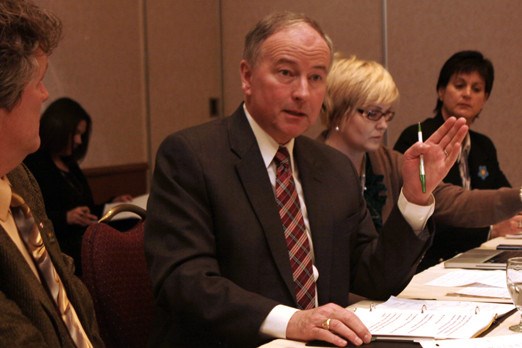As the attorney general of Canada travels across the country, he keeps hearing the same message – substance abuse is a growing concern.
“One of the things that will impress you (is) there are no communities alike; they all have different takes on it,” said Rob Nicholson, Minister of Justice and Attorney General of Canada. “The problem with substance abuse goes right across this country. I hear it again and again.”
It was a message reiterated while he stopped in Thunder Bay Thursday for a roundtable discussion at the Valhalla Inn with local police and community representatives.
One of the suggestions Nicholson heard to help reduce crime rates is to crackdown on drug traffickers.
“There is absolutely no sympathy or tolerance for the people who are in the business of destroying people’s lives through trafficking,” he said, adding the Conservatives have a bill – Bill S-10 – before Parliament directed at stricter enforcement on traffickers.
Nicholson said while critics of the bill say it targets the individuals who have become addicted or someone who has a few marijuana plants in their kitchen, he said it is solely about traffickers and is aimed specifically at organized crime.
The minister also said in Thunder Bay he heard quite a bit on alcohol abuse. Thunder Bay Mayor Keith Hobbs said last year the police made about 3,000 alcohol-related arrests compared to 5,000 alcohol-related arrests in Toronto.
“In Thunder Bay, one of our strategies is to build a drug and alcohol rehabilitation centre so that we can treat people with these addictions,” he said. “That’s foremost on our agenda. We need to help these people but, like the minister said, we also need to start cracking down on these drug traffickers.”
Hobbs said they’ll lobby the government for the funds for a rehabilitation centre; he said right now the city only has 12 detox beds, while Kenora has 50.
“That is something sadly lacking in Thunder Bay,” he said.
While the legislation to crackdown on trafficking is awaiting debate in the House, Nicholson added prevention is also key in the battle against substance abuse, citing the national anti-drug strategy as a big component.
“This is a new commitment by the government of Canada to get the message out through advertising, through education, through co-operation with other levels government to get that message out to not get involved with this type of activity in the first place,” he said. “It’s something I very much agree with and something we have to continue to do.”
Sign in or register
- Messages
- Post a Listing
- Your Listings
- Your Profile
- Your Subscriptions
- Your Likes
- Your Business
- Support Local News
- Payment History
Registered Users
Already have an account?
New Users
Create a free account.
